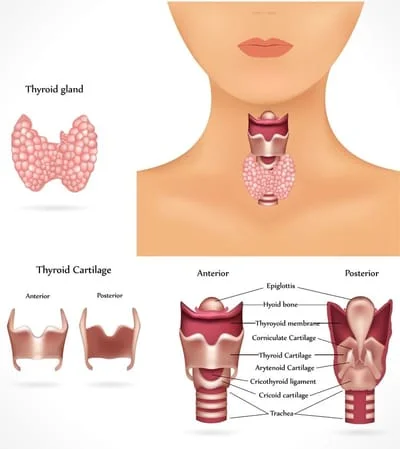“Making Sense of Ineffective Treatment(s) of the Thyroid Gland”
By: Dr. Michael John Badanek BS, DC, CNS, DACBN, DCBCN, MSGR./CHEV.

“The power of patient’s stories is how we Americans change the paradigm of thyroid care”.
As physicians, we are privy to the most private details of our patient’s lives. After quickly telling their spouse to “cover their ears” patients reveal to the physicians their most distressing and embarrassing symptoms. Thyroid patients rarely come with just a thyroid problem. The core symptoms of hot or cold intolerances, weight problems, fatigue, anxiety or depression, tremors, brain fog, constipation or frequent stools are just the beginning of our evaluation. A full evaluation often reveals other conditions found in thyroid patients but not related directly to the hormone function such as; diabetes, hypoglycemia, stress, chronic infections, toxic exposures, allergies, unusual body and joint pains, unhealed injuries, chronic hives, and other conditions. For doctors would work in conventional medicine, where one Chief Complaint is the focus of each office visit, the magnitude of patient’s complaints can become overwhelming. Doctors may cut their patients off or request that they return for a follow up visit(s) to address each and every complaint presented by the patient. The power of knowing the patient’s whole story is never heard or never understood in the full picture of the patient’s complaints. Many doctors start feeling the anxiety of just how many prescriptions must be written in order to address each and every subjective complaint the thyroid patient presents with.
The “pill for every ill” approach is as unsatisfying to patients as it is to the physician treating the patient. Yet, very few physicians have been trained to treat patients otherwise. As physicians who specialize in treating complex patients, it is clear that not only is this approach unsatisfying to patients and physicians alike, but from my experience it simply does not work. Trying to manage ten symptoms using ten medications rarely leads to improvements in a person’s quality of life. I my practice, we focus on a deep understanding of a patient’s story, a patient-centered interpretation of basic and clinical science, and addressing the root of the patient’s illness, not just covering up the symptoms. Thyroid patients need personalized attention and specific care to their individual problem(s).
The functional and integrative medicine approach to thyroid disease is distinguished by an understanding of the interrelationship between the thyroid and the rest of the body. The cause or etiology of most chronic conditions in multi-factorial and the thyroid disease is no different. There is rarely a single problem; more commonly there are many underlying conditions (problems) resulting in the chief complaint. While many physicians consider the cause of thyroid diseases to be unknown (idiopathic), this claim of ignorance ignores the thousands of studies that inform us of how the thyroid is injured by lifestyle, environmental factors, and genetic predisposed factors.
Understanding the complex physiology of the thyroid gland requires an understanding of the needs of the gland itself. Tending to our thyroid health requires knowing the dietary and nutritional requirements of the thyroid, interactions of the thyroid to other bodily systems, and avoidance of thyroid disrupting toxic and inflammatory insulting issues.
Therefore, the thyroid is vulnerable to a wide variety of influences and phenomena that can alter the function and even the structure of the thyroid itself. The integrative medicine framework for understanding and treating thyroid disorders includes a comprehensive evaluation of the patient’s personal history, dietary habits, exposures, nutrient levels, hormone balance, digestive function, immune regulation, microbial pathogens, stressors and more. Only with a careful evaluation based upon both laboratory and clinical data, can an appropriate diagnosis and treatment strategy be developed. The advantage of the integrative practitioner is the ability to deepen an understanding of why thyroid function is compromised, and also deploy an enormous tool kit of resources and clinical interventions to restore global health to the patient and provide specific targeted treatment protocols for the thyroid itself.
If you or any other family members or friends are suffering with chronic long term thyroid problems or other health care issues that have not been successfully addressed and treated by attending physicians we urge you call and set up an appointment today. Dr. Badanek has been in private practice the thirty four (34) years in functional/integrative medicine. He is dedicated in the quest of finding and treating the root cause(s) of disease and not just masking the symptoms. You can schedule an appointment: 352-622-1151 (Ocala, Florida)